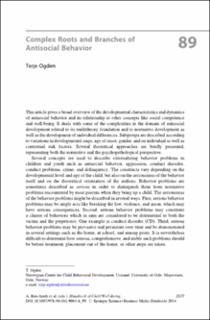| dc.contributor.author | Ogden, T. | |
| dc.date.accessioned | 2023-01-11T13:32:16Z | |
| dc.date.available | 2023-01-11T13:32:16Z | |
| dc.date.issued | 2014 | |
| dc.identifier.citation | Ogden, T. (2014). Complex Roots and Branches of Antisocial Behavior. I A. Ben-Arieh, F. Casas, I. Frønes & J. Korbin (red.), Handbook of Child Well-Being. Springer, Dordrecht | en_US |
| dc.identifier.uri | https://hdl.handle.net/11250/3042743 | |
| dc.description.abstract | This chapter describes the roots and branches of antisocial behavior, or the developmental precursors and consequences of antisocial behavior in children and youth. In addition to focusing on antisocial behavior, it also deals with two related concepts of interest, namely, social competence and well-being. The developmental characteristics of antisocial children and youth are presented along with their relationships to concepts like social competence and well-being. The multitheory foundation of antisocial behavior is presented, and special attention is given to Patterson’s (1982) theory of coercive family processes which represents the reciprocal view on social learning in child-parent interactions. This chapter also focuses on the normative development of aggression in the first years of life, and the developmental tasks facing most children as they grow up. Although not incompatible, different theoretical and empirical angles have been applied to the study of early development of aggression. These theories and related research have particular relevance to the challenges of early identification of and intervention for children at risk for antisocial development. Different assessment strategies are mentioned, exemplified by the medical-diagnostic and the clinical-developmental approaches. The association between antisocial behavior and resource-oriented concepts like social competence and well-being opens up new possibilities of assessing, preventing, and intervening in relation to externalizing problems. The lack of well-being among antisocial children and adolescents is an understudied topic, and conceptualizing antisocial behavior as social incompetence may have far-reaching implications for public education. | en_US |
| dc.publisher | Springer | en_US |
| dc.subject | conduct disorder | en_US |
| dc.subject | antisocial behavior | en_US |
| dc.subject | oppositional defiant disorder | en_US |
| dc.subject | social competence | en_US |
| dc.subject | relational aggression | en_US |
| dc.title | Complex Roots and Branches of Antisocial Behavior | en_US |
| dc.type | Chapter | en_US |
| dc.identifier.doi | https://doi.org/10.1007/978-90-481-9063-8_99 | |
